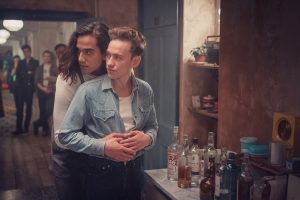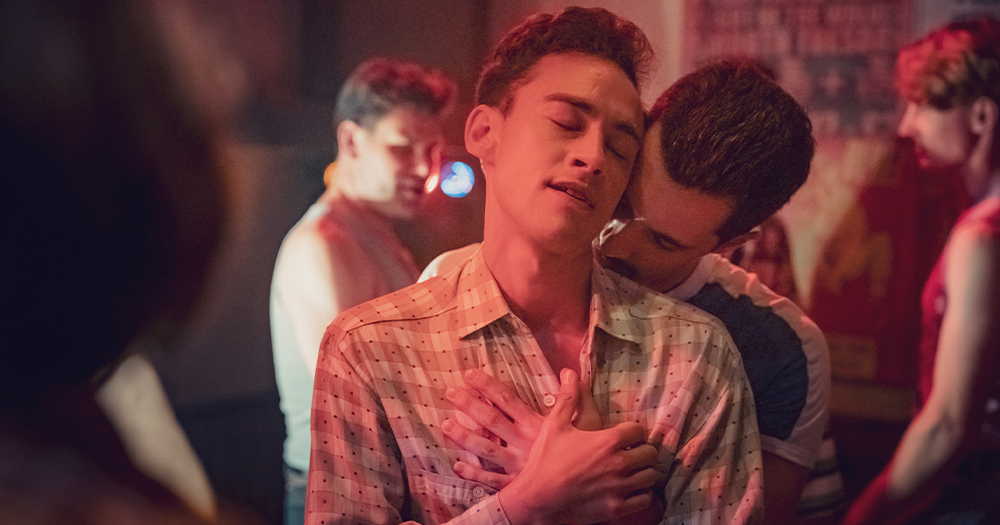“It’s a story that bears telling again and again and again,” says Russell T Davies of the 1980’s AIDS epidemic. The prolific screenwriter, perhaps best known for his gay dramas Queer as Folk, Cucumber, and Banana, is back with his new TV series, It’s A Sin – a story about the impact of the disease on the lives of young gay men during the height of the crisis.
“It’s simply a powerful story,” he continues, “and the world happens to have caught up with us in terms of viruses. It’s very strange now to listen to the radio to hear people talking about the one great virus of their lifetime and think ‘no, there’s been two.'”
The show opens as 18 year-old Ritchie (Years & Years frontman Olly Alexander) moves from the Isle of Wight to London in 1981. There he meets Roscoe (Omari Douglas), Colin (Callum Scott Howells), and Ash (Nathaniel Curtis), and they all move in together in a house they name The Pink Palace. The series follow these boys and their lives as the scale of the AIDS epidemic grows over the course of the decade.
The group is rounded out by Jill (played wonderfully by Lydia West), who it quickly becomes clear is the golden, beating heart of the show. Based on Davies’ own friend Jill (who appears in the show herself, playing the fictional Jill’s mother), the show at times belongs to Jill, and West brings her to life vividly: brimming with optimism, a keen sense of the right thing to do, and a fierce determination to see it through. Together, these five create a chosen family. It’s that bond and the strains that the epidemic puts on it that the story largely follows.

For all that It’s A Sin is about the impact and threat of AIDS for the men, Davies also chooses to place a spotlight on the important women in their lives. Along with Jill, we see a lot of the groups’ mothers, and how their parenting choices impact their sons. Keeley Hawes, as Ritchie’s mum Valerie, threatens to run away with the entire show when given one particularly lengthy scene to lead.
There’s also the women who were the lawyers, the nurses, and the activists, among others, who get their moment in the spotlight. With only five episodes to cover the decade (each episode picks up two years on from the last), capturing everything in that limited time is a challenge and not everything that the show touches on gets fleshed out. “I wish it was 20 episodes long,” laments Davies, “I never got to pay tribute to the nursing staff who were lesbians: when some staff wouldn’t touch AIDS patients, the lesbian staff would step forward and say, ‘we’ll do those late nights, we’ll do those extra shifts.’ That’s slightly in there, but I could have written a whole episode about that.”
What is really remarkable is just how much within the show remains relevant: the stigma and shame around both gay sex and HIV remains, as do the myths and falsities about transmission of the latter. “It’s still ongoing, I think,” Davies says. “I’ve always been wary about talking about it in the past tense. There’s still an awful lot of people who don’t get tested and still an awful lot of prejudice.”
It’s A Sin spends much of its time focusing on the unjust treatment of those who are suffering from HIV/AIDS, and is not afraid to shine a light on how cruel the disease can be. The anxiety and paranoia slowly ramps up as the series continues; characters have deeply uncomfortable conversations with those in the throes of dementia brought about by their condition; and we see men abandoned and isolated or, almost worse, pulled out of society by a family too ashamed and self-absorbed to allow anyone else to know the truth.
Davies spoke about employing the “hard stare” when creating his previous gay drama, Cucumber, and a similar philosophy can be seen here: he doesn’t shy away from the progression of the epidemic or its effects on those who find themselves affected. In that sense, It’s A Sin is more closely aligned to 120 BPM than it is Pose or Pride.

It’s easy to focus on the epidemic and how it impacts the group, but It’s A Sin remains staunchly, blissfully sexy and fun. Dialogue flows wonderfully, the lighting and music capture the era, and there is denim and mohair everywhere. Gay bars are busy and dance floors are full, and The Pink Palace hosts parties and drag nights that we can all aspire to match later this year
Sex and sexuality is a defining part of these boys’ lives, and the show embraces that wholeheartedly. Despite the risks that we know each of their escapades is laced with, it’s difficult not to get swept up with the glances across rooms and the sweaty nightclub hookups. The first episode features a montage of Ritchie’s late night conquests once he arrives in London, although it gets off to a false start with a moment of honesty that I have never seen portrayed on-screen before. Davies also offers a variety of stories within the series so that there is never a sense that any of the boys who find themselves suffering from HIV/AIDS have brought it upon themselves or deserved it, a stigma that people living with HIV still face today.

I think this is where It’s A Sin excels: it never allows itself to be fully defined by the horrors it portrays. These young men and their enthusiasm for life and parties and sex is utterly relatable, and the friendships that they form and that endure during such a tough time are touching. That doesn’t mean the show pulls its punches about the injustices and trauma inflicted upon them: the ending is particularly effective as it places the audience in the same situation as the characters, subverting expectations with a thumping impact.
It’s A Sin ultimately drives home what we lost during that decade: too many people, along with their talents and passion and all they had to give to the world. But it also stands as a tribute to them, to how their love and memories endure, and as an appeal for empathy and compassion during trying times.
It’s A Sin airs weekly on Channel 4 at 9pm from 22 January, with all episodes also available on All 4 from 22 January.
© 2021 GCN (Gay Community News). All rights reserved.
Support GCN
GCN is a free, vital resource for Ireland’s LGBTQ+ community since 1988.
GCN is a trading name of National LGBT Federation CLG, a registered charity - Charity Number: 20034580.
GCN relies on the generous support of the community and allies to sustain the crucial work that we do. Producing GCN is costly, and, in an industry which has been hugely impacted by rising costs, we need your support to help sustain and grow this vital resource.
Supporting GCN for as little as €1.99 per month will help us continue our work as Ireland’s free, independent LGBTQ+ media.
